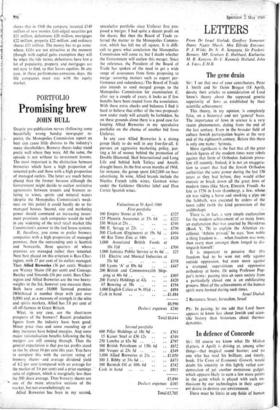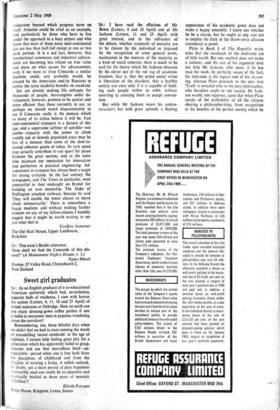In defence of Concorde
Sir: Of course we know what Dr Mishan (Letters, 4 April) is driving at, among other things—that magical sound barrier; and no one who has read his brilliant, and timely. book, The Costs of Economic Growth, would doubt his sincerity in this lightly veiled con- demnation of yet another monstrous gadget, which appears likely to earn a few more points in the game which is played with such en- thusiasm by our technologists in their appar- ent desire to destroy our environment.
There must be limits in any-fields of human endeavour beyond which progress turns on itself. Aviation could be cited as an example, and particularly by those who have to live under the approach to a busy airport and who know that most of those noisy inter-continental jets are less than half-full except at one or two peak periods. It is a sad fact, however, that international commerce and industrial achieve- ment are becoming less reliant on true value and more on what passes for advancement; even if we were to drop Concorde a similar machine could, and probably would, be created by the Americans and/or Russians to confer the same doubtful benefits on mankind.
Jets are already making life unhappy for thousands of people. Aero-engines under de- velopment, however, promise to be quieter and more efficient than those currently in use, so perhaps we should watch dispassionately to see if Concorde really is the menace which so many of its critics believe it will be. Fast inter-continental transport is a feature of this age, and a supersonic airliner of sensible—not jumbo—capacity with the power to climb rapidly out of densely populated areas may be less of a menace than some of the slow-to- ascend subsonic giants of today. Its very speed may actually contribute to our quest for peace between the great nations, and at the same time maintain our reputation for innovation and perfection in practical engineering. Ad- vancement in transport has always been a target for strong criticism. In the last century the newspapers, and The Times in particular, were' unmerciful in their onslaught on Brunel for building an iron steamship. The Duke of Wellington attacked railways, because he said 'They will enable the lower classes to move about unnecessarily.' There is somewhere a happy medium, and without wishing further torment on any of my fellow-citizens I humbly suggest that it might be worth waiting to see just what that is.
Geoffrey Somerset The, Old Malt House, Upper Lambourn, Berkshire



































 Previous page
Previous page